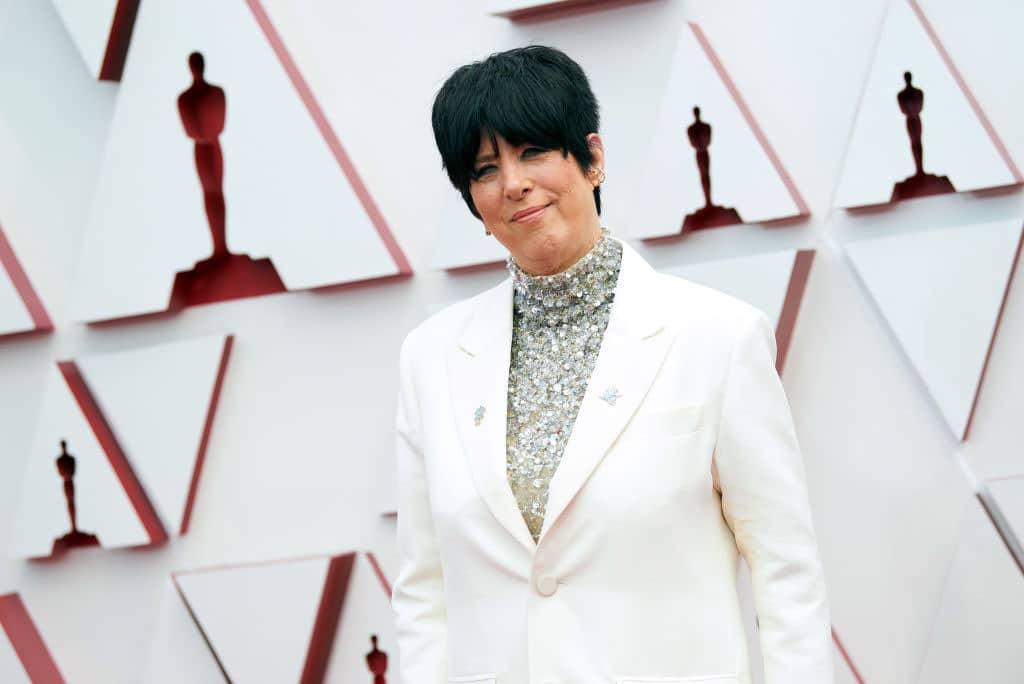 Diane Warren attends the 93rd Annual Academy Awards at Union Station on April 25, 2021 in Los Angeles, California. (Photo by Matt Sayles/A.M.P.A.S. via Getty Images)
Diane Warren attends the 93rd Annual Academy Awards at Union Station on April 25, 2021 in Los Angeles, California. (Photo by Matt Sayles/A.M.P.A.S. via Getty Images) Songwriter Diane Warren knows what it takes to bridge divides. Since 1979, she has written hundreds of songs spanning a litany of genres. Her songwriting collaborators include Beyoncé, Elton John, Gloria Estefan, Snoop Dogg, and even writing with rockers such as Joan Jett, KISS, and Alice Cooper.
And many agree that her songwriting is powerful.
Several of Warren’s songs became number one hits on the Billboard Top 100. Twelve of them have been nominated for the Academy Award for Best Original Song—including country tearjerker “How Do I Live?” from the film Con Air and the power ballad “I Don’t Wanna Miss A Thing” from Armageddon (which is still Aerosmith’s only #1 hit).
Warren’s most recent Academy Award nomination is for a song called, “Io Sì” (italian for “Seen”) from the film The Life Ahead. The film is about an elderly holocaust survivor in Italy (played by Sophia Loren) who takes care of a young Senagalese refugee.
Co-written and performed by Laura Pausini, the song is a heart-wrenching compliment to the film’s motifs of solitude, trauma, and the struggle for human connection.
The refrain in “Io Sì”, “I want you to know that you’re seen,” resonates with audiences around the world all suffering a shared peril. It has now been recorded in several languages by Warner Music Italy, streamed millions of times by listeners.
“The song took on added meaning with what’s going on in the world because we don’t see each other, really, so many people feel invisible,” Warren said in a recent interview. “Then we have COVID on top of it. People can’t see their friends, can’t see their families, they’re locked in their houses and apartments.”
The opening lyrics of reassuring love speak directly to those audiences: When you feel like no one understands you, I will, I will. / When you think no love can ever heal you, mine will, mine will.
Warren’s lyrics aren’t just platitudes. She is an active member of the Creative Community for Peace (CCFP) — a non-profit founded in 2012 that gets prominent artists and performers to promote the arts as a bridge to peace, to counter antisemitism within the entertainment industry, and to galvanize support against the cultural boycott of Israel.
Warren’s lyrics aren’t just platitudes.
The arts are a vital mechanism in creating lasting change. For audiences living far away from a conflict zone, an effective way to get the unaffiliated to take notice isn’t just the evening news. Politicians and generals can yell and scream at people how they should feel about something, but it’s the artists who create the feeling itself.
The CCFP stands firmly that entertainers boycotting Israel are not helping in the quest for peace between Israel and Palestine. A film, a song, a book, a painting—those tell a story, they bring in new audiences, create new perspectives, and promote empathy.
Warren agrees, that “nothing can change the world like music. Music goes to your heart not to your brain, it’s visceral. You react to music, you don’t think about music.”
When The Life Ahead director Eduardo Ponti (who is also Sophia Loren’s son) sent the script to Warren, she thought it was “such a beautiful story” of bringing people together.
“The idea that you can make families with whoever, you become a family no matter what your background is, what the color of your skin is, what your beliefs are, true love,” Warren explained in an interview with CCFP.
Warren’s own family was very much on her mind during the 93rd Academy Awards. Although her song did not win, the day held an even more special meaning for her: the ceremony took place on what would have been her father’s birthday, April 25th.
“My dad was the first person to ever believe in me,” she reflects, noting that her first Oscar win after twelve nominations would have been a “great birthday present” for her father.
Warren’s father passed away in 1987 at age 70, just before her first Oscar nomination for writing the song “Nothing’s Gonna Stop Us Now” from the film Mannequin (a song which played on screen during this year’s ceremony immediately following the acceptance speeches from the producers of Nomadland after winning Best Picture).
Before the ceremony, when asked if she had been preparing a speech for her potential first Oscar, Warren lamented that she had not done so, admitting “I’m just gonna cry if it happens!”
And it would have been fitting, as audiences listening to her acclaimed song lyrics over the years have been brought to tears as well.
Brian Fishbach is a music journalist in Los Angeles.























 More news and opinions than at a Shabbat dinner, right in your inbox.
More news and opinions than at a Shabbat dinner, right in your inbox.